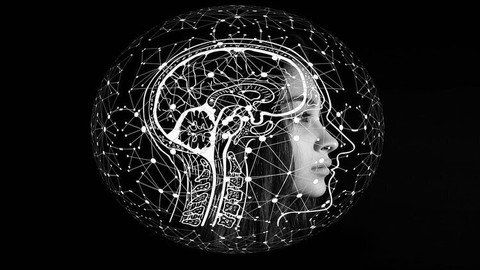
Published 2/2023
MP4 | Video: h264, 1280×720 | Audio: AAC, 44.1 KHz
Language: English | Size: 659.66 MB | Duration: 0h 32m
Powerful AI for Real-World applications can be created by combining the strengths of data science, machine learning.
What you’ll learn
Understanding of the basic concepts and principles of Artificial Intelligence: Learners will gain a comprehensive understanding of the fundamental concepts
Familiarity with AI algorithms and techniques: Learners will become familiar with various AI algorithms and techniques, such as supervised and unsupervised lear
Ability to apply AI to real-world problems: Learners will develop the ability to apply AI to real-world problems, such as image classification, natural language
Knowledge of the current state-of-the-art AI models and techniques: Learners will gain knowledge of the current state-of-the-art AI models and techniques, such
Requirements
You will gain an overview of what you need to know.
Good course for those new to AI or need more information on what are the steps in making an AI.
Description
10 Modules in Total.1. Build An AI2. Make a virtual self driving car3. solve real world problems with AI4. Q-learning5. Deep Convolutional Q- Learning6. Understand the theory behind artificial intelligence7. Make an AI to beat games8. Master the State of the ART AI models9. Deep Q-Learning10. A3C-In-depth understanding of Machine Learning: Learners will acquire a deep understanding of machine learning concepts, such as supervised and unsupervised learning, decision trees, random forests, support vector machines, k-means clustering, and principal component analysis. They will also learn about the different types of machine learning, including supervised, unsupervised, semi-supervised and reinforcement learning.-Hands-on experience with Neural Networks and Deep Learning: Learners will gain hands-on experience with neural networks and deep learning, including feed forward neural networks, back propagation, convolutional neural networks, and recurrent neural networks. They will also learn about popular deep learning frameworks such as TensorFlow, Keras, and PyTorch.-Natural Language Processing and Computer Vision: Learners will gain an understanding of natural language processing and computer vision concepts, including tokenization, stemming, lemmatization, part-of-speech tagging, sentiment analysis, and named entity recognition. They will also learn about computer vision techniques such as edge detection, feature extraction, and object detection.-Expertise in AI Applications: Learners will gain expertise in AI applications, including speech recognition, computer vision, natural language processing, and robotics. They will learn about the latest developments in these areas and how to apply them to real-world problems.-Understanding of the ethical and societal implications of Artificial Intelligence: Learners will gain an understanding of the ethical and societal implications of AI, including issues related to privacy, security, and bias. They will also learn about the impact of AI on society and the economy, and the potential for AI to be used for both positive and negative purposes.-Skills in building and deploying AI systems: Learners will learn the practical skills of building and deploying AI systems including data pre-processing, model training, evaluation, and deployment. They will also learn about the different tools and technologies used in building and deploying AI systems.-Familiarity with the state-of-the-art AI models and techniques: Learners will gain knowledge of the current state-of-the-art AI models and techniques such as deep reinforcement learning, generative models, transfer learning, and meta-learning. They will also learn about the latest research and developments in the field of AI and be able to apply these techniques to their own projects.
Overview
Section 1: Building an AI
Lecture 1 Building an AI
Section 2: Making a virtual self driving car
Lecture 2 Making a virtual Self Driving Car
Section 3: Solve Real World Problems with AI
Lecture 3 Solve Real World Problems with AI
Section 4: Q-Learning
Lecture 4 Q-Learning
Section 5: Deep Convolutional Q-Learning
Lecture 5 Deep Convolutional Q-Learning
Section 6: Understand the theory behind Artificial Intelligence
Lecture 6 Understand the theory behind Artificial Intelligence
Section 7: Making an AI to beat games
Lecture 7 Making an AI to beat games
Section 8: Master the State of the Art AI models
Lecture 8 Master the State of the Art AI models
Section 9: Deep Q-Learning
Lecture 9 Deep Q-Learning
Section 10: A3C
Lecture 10 A3C
Section 11: Build artificial neural networks with Tensorflow and Keras
Lecture 11 Build artificial neural networks with Tensorflow and Keras
Section 12: Classify images, data, and sentiments using deep learning
Lecture 12 Classify images, data, and sentiments using deep learning
Section 13: Data Visualization with MatPlotLib and Seaborn
Lecture 13 Data Visualization with MatPlotLib and Seaborn
Section 14: Classify data using K-Means clustering, Support Vector Machines (SVM), KNN, Deci
Lecture 14 Classify data using K-Means clustering, Support Vector Machines (SVM), KNN, Deci
Section 15: Build a movie recommender system using item-based and user-based collaborative
Lecture 15 Build a movie recommender system using item-based and user-based collaborative f
For everyone wishing to learn more about AI and it’s process of creation till completion.,More suited for beginners to get an overview on what is AI and where do they go from there.,Advance users can just understand and follow the steps listed in building an AI.
Password/解压密码www.tbtos.com
转载请注明:0daytown » Artificial Intelligence: How To Create An Ai Project.